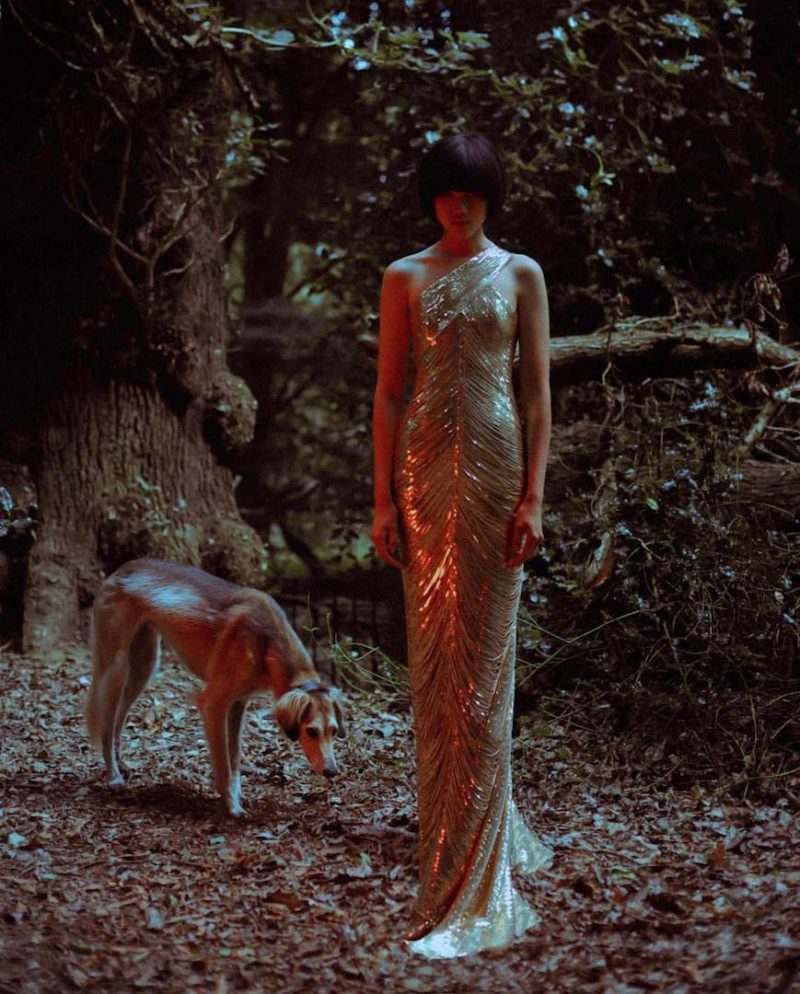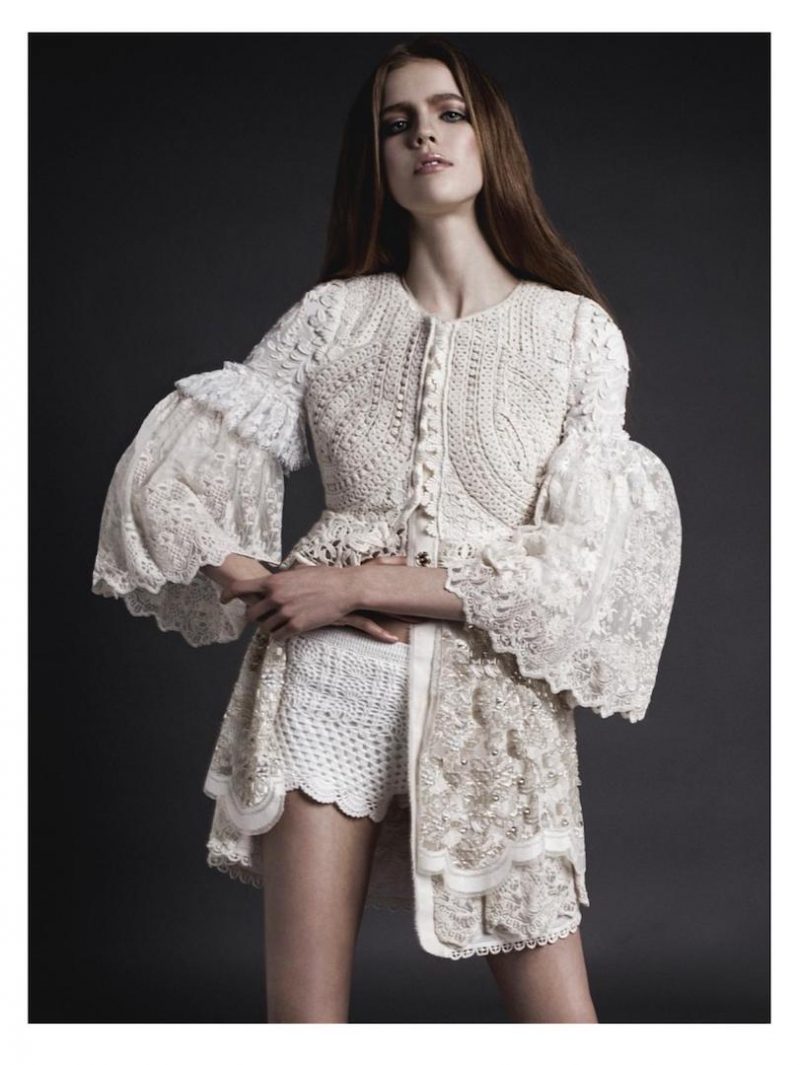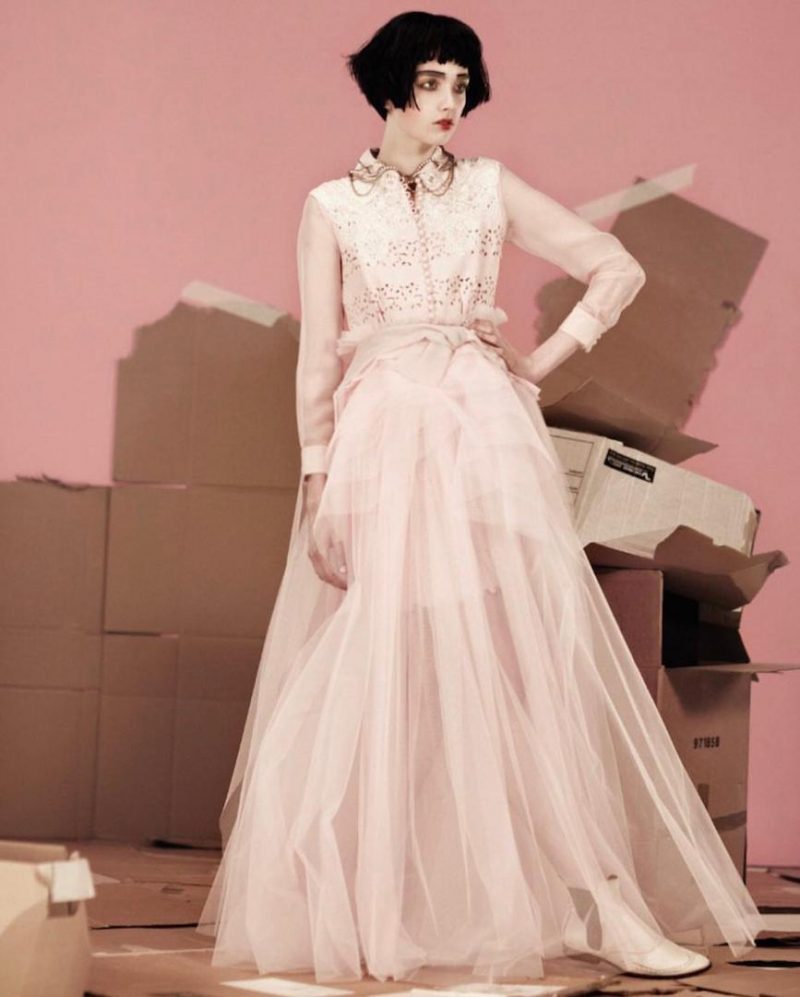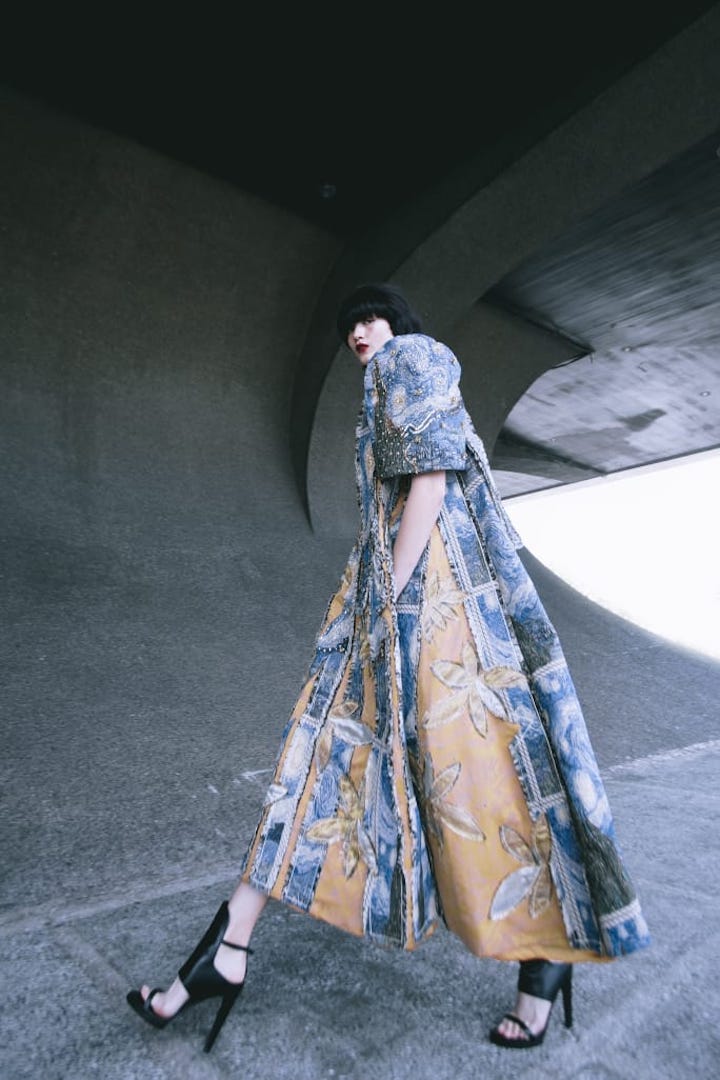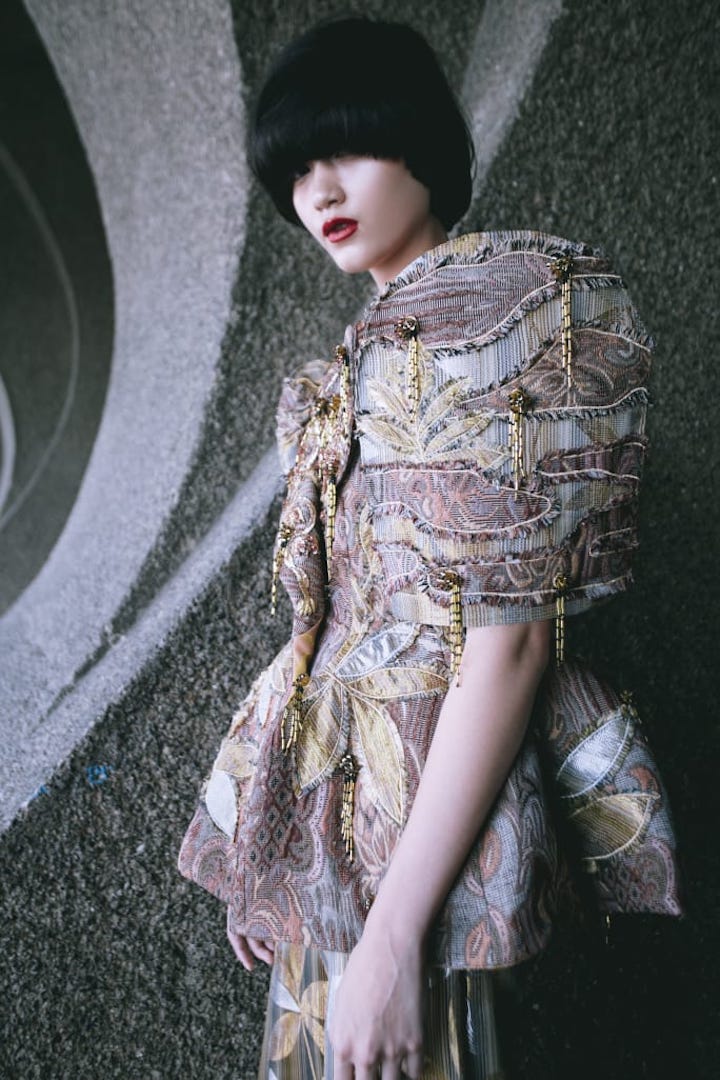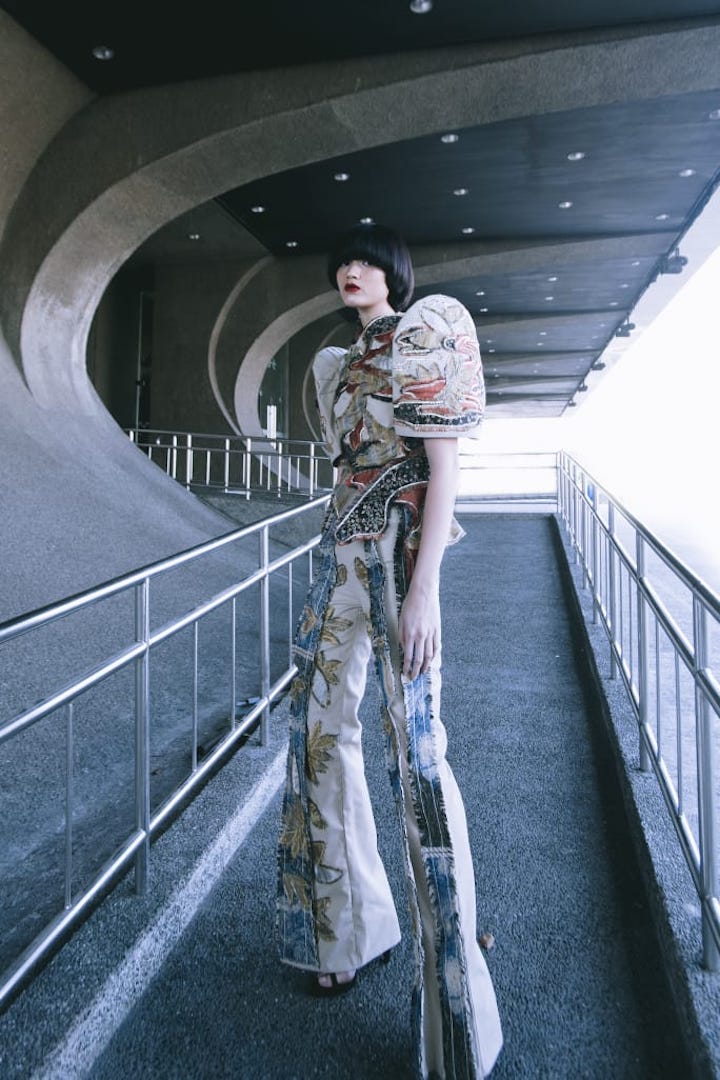
Is Fashion Week going out of fashion?



Can we go back to the way things were before the COVID-19 pandemic made 2020 a year of reckoning? How has the fashion industry been changed by limited face-to-face fittings and reduced production? Were the past few months mere hiccups for fashion houses that were able to showcase their collection in Paris and Shanghai Fashion Week this month?
London-based designer Lesley Mobo, currently in his Samar paradise, catches up with his TernoCon 2020 mentee, up-and-coming designer Renz Reyes. Mobo, a Central Saint Martins graduate, has lent his talents to the likes of Diesel, Harrods’ Jasmine Di Milo, British label Ghost and Uniqlo. His ready-to-wear line MOBO has been sold around the globe and he continues to design for his atelier in London.
On the other hand, Reyes, whose attention to detail and subtle craftsmanship once caught the eye of Vogue, has been collecting local design accolades as a top prize winner in the 2018 Bench Design Awards and as a TernoCon 2020 finalist. Aside from making garments for his own label, he designs for New York-based womenswear brand The Natori Company.
On the other hand, Reyes, whose attention to detail and subtle craftsmanship once caught the eye of Vogue, has been collecting local design accolades as a top prize winner in the 2018 Bench Design Awards and as a TernoCon 2020 finalist. Aside from making garments for his own label, he designs for New York-based womenswear brand The Natori Company.
Yearning for a change in the industry
Lesley Mobo: Hi, Renz. How are you? How’s everything?
Renz Reyes: Everything’s fine, I’m going back to the grind.
Lesley: So how’s the mood at work?
Renz: There are fewer people because the pandemic really hit the company a lot. A lot of the usual people that I work with are not there anymore.
Lesley: [The lockdown forced] us all to find ways to be creative and to solve all these problems. Do you think we [can] get anything positive from this?
Renz: I think the whole industry has been in this system that’s [moving] at a rapid pace. Designers [have] to craft collections faster because the turnover between collections can go at a dizzying pace. Fortunately, this pandemic has given us the time to reassess the industry. Everyone has been yearning for change but everyone seems to be stuck in this system.
Lesley: [What] do you think [of the] wholesale system? Another [way to describe it is] bringing your product into Fashion Week and opening it to retailers and depending on retailers [for your sales]. What do you think is the future for that? A lot of American companies basically went bankrupt because of that system of wholesaling [where retailers] basically direct the designer and the consumer on what product to buy and everything. Is there any chance for that to change?
Renz: My advice is for designers [to] just do seasonless clothing [instead of] all these pre-collections between [their] other collections. It’s unnecessary. Just do two collections a year [instead of per season]. Make it more about quality not quantity. We have been so fixated on doing these filler collections just to follow this fashion [or] marketing calendar.



Lesley: For bigger brands like Saks, Selfridges in London or Galeries Lafayette in Paris, the common practice is for designers to do the usual two collections. But retailers want to use the window between [the autumn/winter and the spring/summer] collections to sell [the] resort and the pre-collection. [Retailers] discovered that [these] pieces have more shelf life and tend to sell better for some odd reason.
What happens is that the media, like Vogue and other media outlets, tend to kind of push the idea of asking designers to do a shoot, do a lookbook. From the lookbook, it became like a fashion show. What’s happened in the last five years, I think, is that smaller brands started emulating what the big brands were doing. You’re basically making a collection every three months rather than every six months. We’re not even talking [about] menswear [yet]. The bottom line of fashion really is doing business.
Renz: In the Philippines, going to stores [to sell your pieces] is a non-existent [practice]. So you’re really forced to market your own products. Some of my friends, also young designers, aren’t stuck in the fashion system. They’re joining trunk shows and bazaars and really speaking to customers. I know that in time, it builds a brand following. These young designers are not in a race to become a big fashion conglomerate.
Lesley: I think it’s quite exciting to see some young designers having a different approach. Some [use] dance. Some [use] film.
“In the Philippines, going to stores [to sell your pieces] is a non-existent [practice]. So you’re really forced to market your own products. Some of my friends, also young designers, aren’t stuck in the fashion system. They’re joining trunk shows and bazaars and really speaking to customers. I know that in time, it builds a brand following. These young designers are not in a race to become a big fashion conglomerate.”
Renz Reyes
Fashion is prostitution
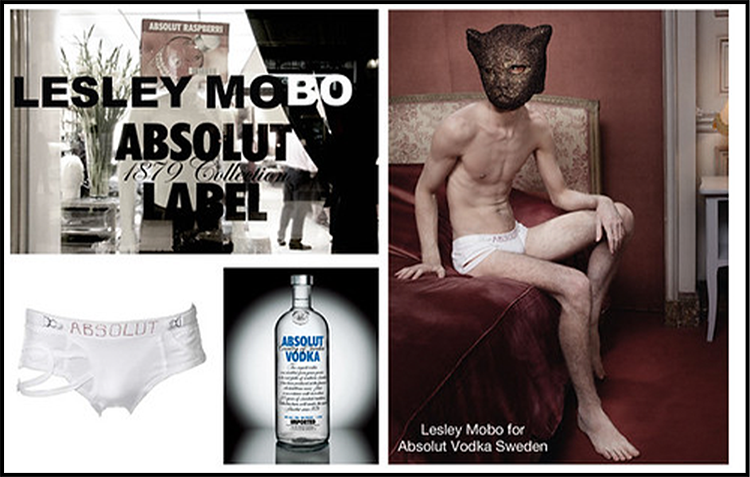
Lesley: This is my collaboration with Absolut Vodka Sweden. I was supposed to do women’s underwear. Because everyone seemed to be doing women’s [pieces], I did this one. It’s really quite scary to look at actually.
Renz: Actually, I remember this.
Lesley: I used to work with Diesel in Italy and I think the same PR [agency that worked with the brand] put me on the book to do this one. It was supposed to be like a high concept underwear. I kind of learned from this that there’s nothing much you can do with underwear. It’s funny because when they did the launching in Manila, they found this American guy who’s really super huge to wear it. The underwear was kind of breaking. When he wore it, it turned out to be more like a Playgirl launch than [one for an] Absolut Vodka underwear 1879 collection.
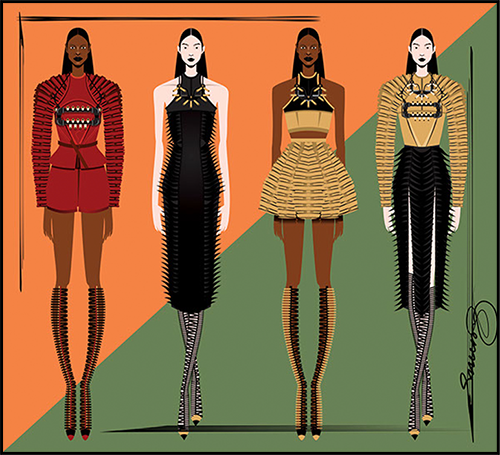
Renz: That’s my graduate collection [from] almost 20 years ago. During that time, I was so obsessed with leather, pleather and all this BDSM fetish upholstery material. All those details are handsewn. I felt bad for my models during my graduation show because I saw all my batchmates’ [models] and they were all wearing these fancy, luxurious materials while my girls were all sweating under this synthetic leather. And I also made these bib necklaces out of wood pipes and bullet shells.
Lesley: But your illustrations [are] kind of like these even then, right? I mean, you [already liked] this type of illustration?
Renz: That’s the first time I learned to do digital illustration because I worked as a graphic designer during that time.
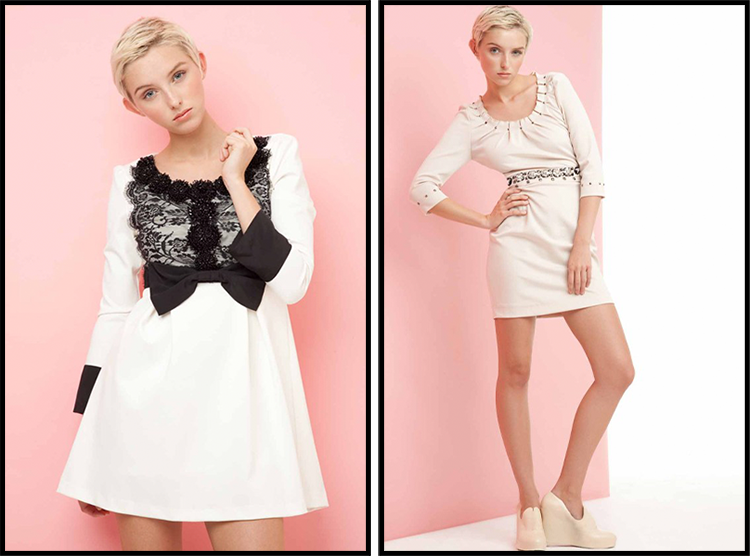
Lesley: Oh my god. Let’s not do that. I don’t wanna look back at this one, which I sold wholesale in Paris. It must be either [our] fifth or sixth ready-to-wear collection. It was very difficult because we were dealing with particular aesthetic demands from different countries. The sizing was a nightmare as well. It served as a good lesson for me.
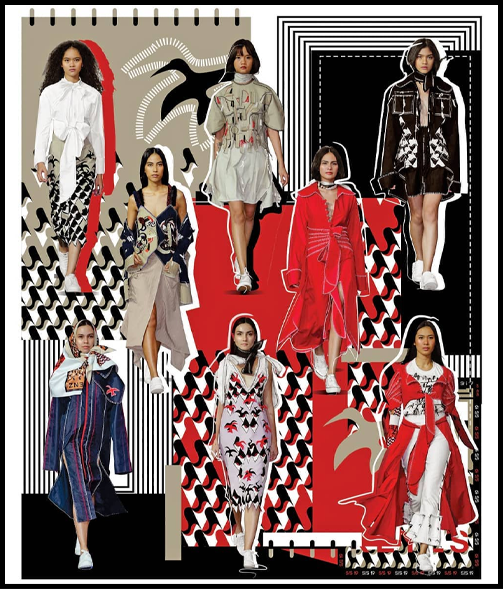
Renz: This collection was inspired by the film “Suspiria.” So all of those motifs are tessellations from M.C. Escher. I just wanted it to look really easy, but when you look at it up close, you [can] see the craftsmanship.
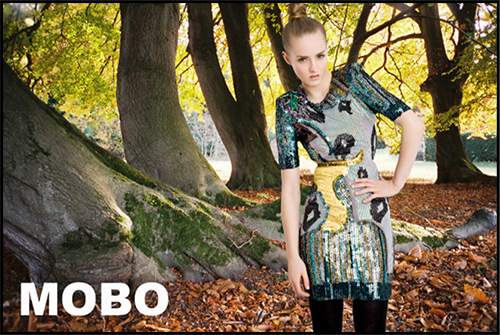
Lesley: This is my stage of prostitution. This is a best-selling collection. MOBO was supposed to be [a] party [dress brand]. For most of my career, I worked for brands and most of the time I’m not even mentioned. And I thought, why not do something separate from what I do for other people? It’s prostitution because it’s not really my particular handwriting. Fashion is prostitution. But, you know, [the] press and buyers, [it’s] kind of funny thing [how] they’re two completely different people. If you show this to the press, maybe [they’ll go,] “Yeah, whatever.” But if you show this to a buyer, they would probably be happy with it.
Renz: I love the sequins.
Fashion is all about inclusivity
Lesley: Being a fashion designer nowadays, from an international point of view, means you have to be bigger than just someone who can cut and sew a garment. You have to be someone with taste in photography, business-savvy, a graphic designer—you have to be an all-singing, all-dancing designer. At the moment, social media sort of ruined that sort of thing because everyone suddenly became a fashion designer.
Renz: Based on my experience, the fashion education here mostly [teaches] you skills but not how to go into the industry and [apply for] certain jobs. Actually, that’s another problem, there aren’t a lot of fashion jobs here. What a designer seems [like] here in the Philippines is just someone who makes clothes. But there are a lot of jobs in fashion aside from being a fashion designer. That is also lacking here. Based on my experience as a designer here in the Philippines, you have to be a multitasker. You need to be able to design [and] do patterns. [Basically,] do everything. It’s not like in other countries [where] there’s a specific person who does a specific job. Lesley, what do you think is the future of fashion?
[READ: Is the era of the ego-centric designer over? Inno Sotto and CJ Cruz think so]
Lesley: I think it’s an exciting time. I sort of waited and waited and waited for a time where it could actually pause itself. But it can’t, because fashion doesn’t really pause. It’s a sort of, kind of a never-ending circle. If you stop working in the fashion industry, the industry will just continue without you. It’s just like a monster. It just keeps eating and eating and eating and eating. Everything is so redundant.
But everything is always in question: how we present things, how we do things. I think fashion, in a way, should really be able to move. You don’t have to go to New York. You don’t have to be based in Paris. You don’t have to be in Milan. You don’t have to be in London to be able to do fashion. I think you could be living in Samar, Jolo or Batanes [and], you know, you could still do fashion as long as you have the internet, a website and a product. That’s what I was hoping [for,] [for fashion to become] more open. I’ve seen so many young Filipino brands, and you’re one of the young designers that I really, really admire.



Renz: We were about to do the Katutubo [pop-up market] before the pandemic hit. I was already finalizing the brand, the clothes that I was about to sell. I already have a vision for the next collection I’m doing. For sure, it’s going to be more commercial because no one’s really going out. What’s still going to be there is the craft because my background is in embroidery and mixing materials, mixing textiles.
Lesley: Going back to how redundant the fashion industry is, doing Fashion Week with separate genders [where] Men’s [Fashion] Week [is] separate from womenswear puts us back to the question of social movements happening now—you know, with Black Lives Matter [and the] #MeToo movement. Trying to separate menswear from womenswear is absolutely obsolete. Fashion is all about inclusivity. Maybe menswear and womenswear should just [become] one. Maybe children’s wear or bridal wear should be all in one Fashion Week. Or maybe there’s no Fashion Week [in the future].
I mean, why do we do fashion? Aren’t there enough clothes for everyone yet? If you look at the news, like [on] H&M and Zara, you know [that] the number of garments that [wasn’t] sold for years is just piling up. I asked myself why I still continue doing fashion [when] I could just easily sit around in a barrio, plant kamote and still be a happy person. Because I don’t need to do fashion. I think we need fashion because it inspires us to be better people. I still like doing fashion because I like to make clothes, express myself and be able to touch people.
“Trying to separate menswear from womenswear is absolutely obsolete. Fashion is all about inclusivity.”
Lesley Mobo
Renz: For the holidays, what are you designing?
Lesley: It would be nice to glam up [for] Christmas. I mean, this is the time to be authentic, to be yourself and to care less about [what other] people [think]. And I think fashion is always about trying to be decisive.
Renz: Personally, I’m just going for comfort this holiday [season. I’ll] just save all the creativity for next year.
Lesley: We’ve gone through so much hardship this year, maybe we should just all go out and celebrate one day. If there’s no reason to celebrate, then maybe we should celebrate.
Renz: There’s always time for a cocktail.
Lesley: We’re all at a crossroads. I don’t think there will be such a thing as a wrong or right decision. I think we’re lacking sincerity. The penetration of the industry by all these [banks] and investment companies that try to acquire brands and sell them off after five years created a problem as well for the fashion industry.
Renz: Since we’re talking about the future, what trends do you want to leave in 2020?
Lesley: I hate trends. I mean the word is quite redundant because trends are just created by people in the industry. We just created trends so that consumers always felt they were getting something new. A trend is created by people who work in Première Vision and want to sell the same types of fabric but in different colors.



Renz: I haven’t been seeing any trends [lately] but I do get your point that [following] trends [is] an outdated concept.
Lesley: For me, fashion is not art but a marriage between creativity and business. I think fashion, in a way, is broken because it’s quite limiting. Trying to be inclusive but at the same time being original is what fashion is all about. It has to be a reflection of [the times].
Writer’s note: This conversation has been edited for brevity
Story by Amrie Cruz
Creative direction by Nimu Muallam
Art direction by Tricia Guevara
Produced by Amrie Cruz
Video by Neal Alday
Assisted by Nadine Halili, Zofiya Acosta, Lia delos Reyes, Alexa Cruz and Michael Yabut
